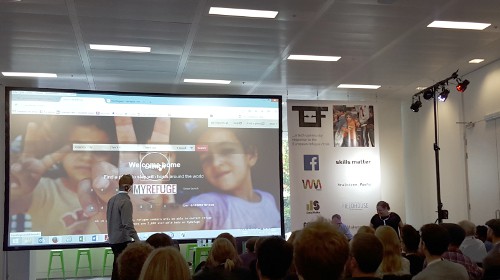“I don’t ever want to have to put an event like this together again,” said Mike Butcher in opening the TechFugees conference last week. The circumstances that inspired him to organise this were certainly beyond dire, but the will to make a difference was palpable in the crowded room.
It’s the sort of thing that could only really happen in a place like London. It took little more than a week for the TechCrunch Editor-At-Large and a group of volunteers to mobilise hundreds of entrepreneurs, coders and NGO representatives; A logo was designed “in about an hour,” website and social media pages sprung up, sponsors came forward, venue and food were donated, attendees snapped up their Eventbrite invites, and before you could say hashtag, #techfugees started trending on Twitter.
So far, so techy. But as Tom Cheshire noted on a recent article for Sky News, the attendees were not there to pat themselves on the back. The way that start-ups are used to building things on the fly, iterating and adapting them to fluid situations, is actually an ideal fit to solve some of the many problems thrown up by the Syrian refugee crisis.
What does that look like in practice? Anything from sailing a boat full of entrepreneurs and engineers to Greece to making your premium features available for free to help refugees learn English and German, or mapping a database of over 2100 migrant journeys, making them less vulnerable to misinformation and extortion by smugglers.
It’s really tempting to dismiss the importance of technology in the context of such a dramatic crisis. After all, when you’re dealing with chronic lack of food and medicine, or having to share one portaloo between 100 people, no Wi-Fi pales in comparison. But the picture is not that simple, says Sadaf Ahmed from the Musafir Collective as she described the appalling conditions in the Calais refugee camp known as ‘The Jungle’. “Communication is an essential part of what we need, as many refugees depend on technology to connect with loved ones they lost along their journey.”
Other ideas for using technology to meet those real pressing needs included tools providing immigration advice, collecting aid more effectively, connecting people willing to host refugees with those needing shelter, allowing children to continue their education while displaced, or helping doctors deliver care to refugees.
“Smart technologies can respond to these issues by making direct connections,” explained Sonia Ben Ali, from Urban Refugees, talking about how the tech community can help the situation by aiding outreach, connecting them with NGOs, and making refugee voices heard.
To do that, we need joined-up thinking, said Klaus Bravenboer from Hack Humanity: “There’s no such thing as a ‘best idea,’ we all need to work together”. Hackathons like the TechFugees one are a great way of making those connections between people on the ground and those building tools for them, and also to link technical and non-technical talent, grassroots with policy makers. That’s the thinking behind platforms like Hashtag charity which matches up willing tech talent with high-impact social projects, and also acts as a repository for work that can be handed over when people need to go back to the day job.

But whatever it is that you’re doing, the important thing is to constantly remind yourself of the real person you’re building this tool for, urged entrepreneur Marieme Jamme, who gave a moving first-hand account of her own refugee experience. User-centric design is a concept that will resonate with any successful technology entrepreneur, but hearing about the difference technology can make to people’s lives in their hour of greatest need is both humbling and inspiring.
Do you think technology can make a real difference to the biggest problems facing society? At Cite This for Me, a Chegg Service, we certainly think so! Leave a comment below to let us know what you think. And if you would like to join the TechFugees community and contribute in any way, do reach out to them on Facebook and Twitter.
Bibliography
Create citations like these in Harvard referencing, APA format, MLA format and more with Cite This For Me citation generation tools!
<https://blog.busuu.com/germanforrefugees-busuu-offers-free-german-english-courses-for-syrian-refugees/> [accessed 5 October 2015]
‘Global Initiative’ <http://www.globalinitiative.net/> [accessed 5 October 2015]
‘Hack Humanity Welcome’ (Hack Humanity) <http://www.hackhumanity.co/> [accessed 5 October 2015]
‘Home’ (ammado) <https://www.ammado.com/> [accessed 5 October 2015]
‘Ich Bin Hier | انا هنا | I Am Here – Worldwide Hack/Mod’ (Eventbrite, 2015) <http://www.eventbrite.com/e/ich-bin-hier-i-am-here-worldwide-hackmod-tickets-18685052495> [accessed 5 October 2015]
‘MedShr’ <https://en.medshr.net/> [accessed 5 October 2015]
Migreat, Family Visa, and Indefinite Leave to Remain, ‘Migreat’s Immigration Platform: An Easier Way to Migrate and Settle Down in a New Country.’ <https://www.migreat.com/en/> [accessed 5 October 2015]
‘Musafir Collective Calais/Kos/Europe’ <https://www.facebook.com/refugekitchen?fref=ts> [accessed 5 October 2015]
‘New Initiative’ (Project Temp Home) <http://www.projecttemphome.com/> [accessed 5 October 2015]
OrphanGift, ‘Helping Orphanages World Wide’ <https://orphangift.org/> [accessed 5 October 2015]
‘Startupboat.eu’ <http://startupboat.eu/> [accessed 5 October 2015]
‘TechFugees – a Tech Community Response to the European Refugee Crisis’ (TechFugees – a tech community response to the European refugee crisis, 2015) <http://www.techfugees.com/> [accessed 5 October 2015]
‘Techies Unite To Tackle Challenge Of Refugees’ (Sky News, 2015) <http://news.sky.com/story/1563102/techies-unite-to-tackle-challenge-of-refugees> [accessed 5 October 2015]
‘Uniting Tech and Charity for Impact’ <https://hashtagcharity.org/> [accessed 5 October 2015]

